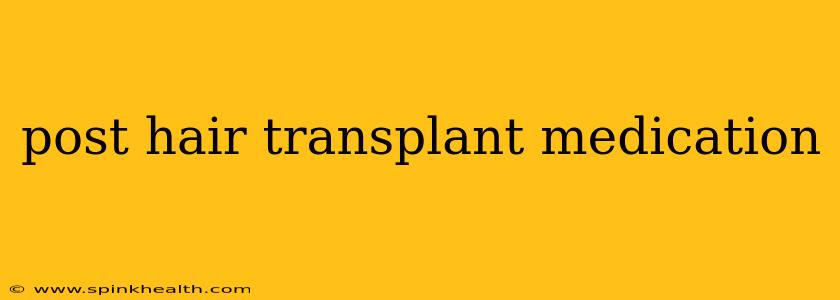The moment you leave the hair transplant clinic, a new chapter begins – one filled with anticipation and the careful nurturing of your newly transplanted hair follicles. This is where post-hair transplant medication plays a crucial role. It's not just about pills and potions; it's about a carefully orchestrated plan to optimize healing and maximize the success of your procedure. Think of it as the final, vital piece of the puzzle, ensuring your investment yields the best possible results.
Let's delve into the world of post-hair transplant medication, dispelling common myths and clarifying the essential steps to a successful recovery.
What Medications Are Typically Prescribed After a Hair Transplant?
Following a hair transplant, your surgeon will likely prescribe a combination of medications tailored to your individual needs. These usually include:
-
Antibiotics: These are your frontline defense against infection. Imagine your scalp as a newly sown field – it needs protection from unwanted intruders. Antibiotics help keep the area clean and reduce the risk of complications. The type and duration of antibiotics will vary depending on your surgeon's assessment.
-
Pain Relievers: While the procedure itself is usually minimally invasive, some discomfort is expected. Pain relievers, such as ibuprofen or acetaminophen, can help manage any post-operative soreness.
-
Anti-Inflammatory Medications: These medications help reduce swelling and inflammation, promoting faster healing and reducing discomfort. This is particularly important in the days immediately following the procedure.
-
Minoxidil (Topical): Often prescribed to support hair growth and help the transplanted grafts thrive. This is not always prescribed immediately post-op, but may be recommended later in the recovery process.
What Are the Potential Side Effects of Post-Hair Transplant Medication?
While generally safe and effective, post-hair transplant medications can have side effects. These vary depending on the specific medication. Common side effects can include:
- Nausea: This is more common with stronger pain relievers.
- Stomach Upset: Some medications can irritate the stomach lining.
- Allergic Reactions: Although rare, allergic reactions to antibiotics or other medications are possible. Always inform your doctor if you experience any unusual symptoms.
How Long Do You Need to Take Medication After a Hair Transplant?
The duration of medication varies depending on the individual and the specific medications prescribed. Antibiotics are typically taken for a short period, usually around 7-10 days, while pain relievers might be needed for a few days or weeks depending on your comfort level. Your surgeon will provide a detailed schedule. Never deviate from the prescribed dosage and duration without consulting your doctor.
Can I Take Other Medications with My Post-Hair Transplant Medications?
It's crucial to inform your surgeon about any other medications you are taking, including over-the-counter drugs, vitamins, and supplements. Some medications can interact negatively with post-hair transplant medications, potentially leading to complications.
What Happens if I Don't Take My Post-Hair Transplant Medication?
Failing to take your prescribed medication increases the risk of infection, inflammation, and slower healing. It could compromise the success of your hair transplant, potentially leading to poor graft survival and unsatisfactory results. Following your doctor's instructions precisely is paramount.
What Should I Do If I Experience Side Effects?
If you experience any unusual side effects, contact your surgeon or doctor immediately. Don't try to self-treat. Your medical team can assess the situation and adjust your medication as needed.
Your post-hair transplant journey is a collaborative effort between you and your medical team. By diligently following their instructions, especially regarding medication, you significantly increase your chances of achieving the beautiful, natural-looking results you desire. Remember, open communication with your surgeon is key to a successful recovery.

